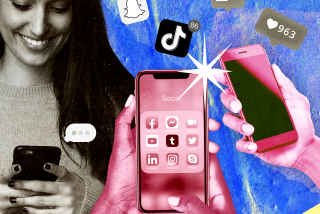Sexting, digital harassment down among young people, survey says
Stop the presses: There’s some good news about teens and sexting.
Fewer teens and young adults have received sexual messages or other forms of “sexting” than a few years ago, according to a new survey of nearly 1,300 people ages 14 to 24.
Two years ago, 32% said they had been involved in some form of sexting; this year that number fell to 26%.
Pollsters also found fewer numbers of teens and young adults had suffered from digital rumors, spying or other harassment.
For instance, the share of young people who had been victimized by someone logging into their email, Facebook or other social media accounts and impersonating them online fell from 21% to 15% between 2011 and 2013.
In all, the survey found the percentage of young people who had weathered some kind of “digital abuse” had fallen from 56% to 49%.
The survey released Thursday by MTV and the Associated Press-NORC Center for Public Affairs Research used online panels to survey young Americans about their digital habits.
Teens and young adults who did not have Internet access were provided with laptops and an Internet connection. Researchers then compared the results to two earlier rounds of the survey.
Not everything has changed, the survey found. Teens and young adults reported much less progress on “digital dating abuse,” such as a boyfriend or girlfriend reading their text messages without permission, or making them remove exes on social networking sites.
Young people were still about as likely to have shared naked photos or videos of themselves as in the past, the survey found. But compared to four years ago, teens and young adults are now less than half as likely to have sent such photos to someone they only know online.
In addition, fewer young people said they had received naked photos or videos of someone else or were pressured by someone to send naked photos or videos of themselves, the survey showed.
Why are those numbers dropping? It might be that young people take online harassment more seriously. Teens and young adults are increasingly aware that digital abuse is destructive, the survey found, with 72% calling it a big problem that should be addressed.
Young people have also become more likely to turn to their families for help. This fall, 44% of teens and young adults surveyed said they had gone to a family member when someone harassed them online, an increase from the 35% who did so in 2011. More than half said telling family improved the situation.
“Parents maybe don’t realize the extent to which their children really do look to them -- and the extent to which they can have an influence in their behavior,” said Trevor Thompson, director of the AP-NORC Center for Public Affairs Research.
However, teens and young adults are uneasy about offering such help themselves. Just under half said they would probably step in and ask someone who was being mean online to stop what they were doing -- fewer than two years ago, the survey showed. If they witnessed the same kind of harassment in person, more than two thirds said they would likely step in.
The results were released as part of MTV’s “A Thin Line” campaign against digital abuse, which aims to help young people draw the line between ordinary jokes and harassment.
ALSO:
Greenhouse gas emissions on the decline, EPA study says
Slain Massachusetts teacher led her class in school and online
Maryland attorney general, candidate hit for ignoring drinking teens
emily.alpert@latimes.com
More to Read
Sign up for Essential California
The most important California stories and recommendations in your inbox every morning.
You may occasionally receive promotional content from the Los Angeles Times.











